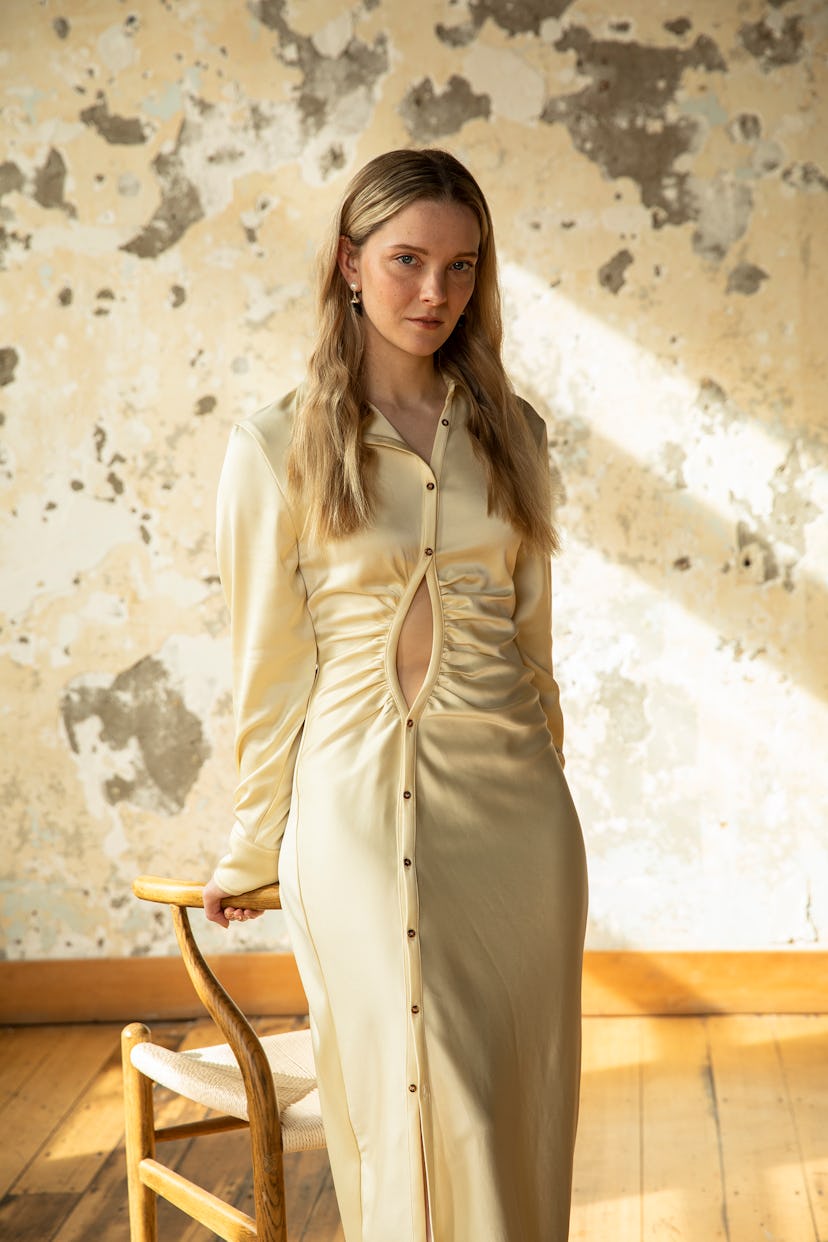Saint Maud Star Morfydd Clark Will Scare You All the Way to Hell

Signing on to star in Amazon’s upcoming Lord of the Rings prequel series is not a decision to be taken lightly. For those still in the throes of filming the first season’s episodes, the career milestone came at the price of a roughly three-year oath of silence and relocation to remote New Zealand. Take, for example, Morfydd Clark: The actor, who can’t even officially confirm that she’s playing Lady Galadriel, hasn’t seen her parents since Christmas of 2019. “I was kind of jet-lagged and emotional,” Clark recalled on Zoom. “It almost felt like it didn’t happen. And then I came back and I’ve been here ever since.”
Clark’s parents can at least spend time with their daughter vicariously, through watching her films. Unfortunately, those films tend to have a common theme: “Terrible things happen to me,” Clark says with a laugh. In the case of her latest, Saint Maud, that may be an understatement: The titular role finds Clark in a constant state of self-induced pain, whether lining her shoes with nails or simply kneeling on popcorn kernels.
Maud performs the latter activity in front of a crucifix. The character converted to Roman Catholicism after leaving her job at a hospital, where she seems to have had a traumatic experience with a patient. Now a live-in hospice nurse who’s shed her birth name, Kate, Maud is several levels beyond ascetic. Her devotion quite literally controls her, including (and increasingly disturbingly) physically.
“Most of the time, it’s just like He’s physically in me or around me,” Maud explains to Amanda (Jennifer Ehle), a dying patient she’s hoping to cure of atheism. “It’s how He guides me. Like, when He’s pleased, it’s like a shiver, or sometimes it’s like a pulsing, and it’s all warm and good. He’s just there.” If that sounds erotic, well, it kind of is: The film’s director, Rose Glass, has referred to Maud’s fits as “godgasms.”
Now finally streaming on Epix, after pandemic-related delays, the film was first a hit at the 2019 Toronto Film Festival. It was a moment for Clark; of those who already knew her name, many had learned it just three days prior, with the premiere of The Personal History of David Copperfield. (Her most prominent role thus far was onstage in The Old Vic’s King Lear.) The film’s long-awaited wide release has prompted a whole new wave of rave reviews. “Her body is a stage for Saint Maud‘s demonic dance,” Entertainment Weekly wrote, while Variety characterized Clark’s performance as one of “brilliant, blood-freezing intensity.”
Before talking to Clark, I would have never recommended Saint Maud to those who, like myself, aren’t built for watching scary movies. But the actor made me see the film in a different—albeit bleaker—light. “I never felt like we were filming a horror [film],” Clark says. The cast and crew understood it as a tragedy, starring not a possessed archetype, but a hopeless, utterly alone young woman faced with “casual cruelty.” Cast out by society, Maud must create her own world. And as that world crumbles, it takes her along with it. “I think I can speak for everyone who was involved, that we all kind of came out of it gentler,” Clark says. “Rose ignited all of our empathy to 100.”
Clark even related to Maud—and so, too, might those who’ve simply bungled a conversation at a bar or ever struggled to fit in. Funnily enough, Clark also has something in common with Maud’s demon. Glass decided it would speak Welsh, after overhearing an agitated Clark speak a mixture of passionate Welsh and English on the phone with her sister.
Clark, who is 30, is not religious. And it’s for that very reason that religion has been on her mind for more than two decades, dating all the way back to when she was nine. “I remember we were up in North Wales, with my mom’s family, my sister and I were having a bath together,” she recalls. “I remember it was this maroon-y, pink-y colored bath—like my mind screenshotted it, because it was obviously a moment of big kind of existential crisis at a young age.” It was at that moment that Clark learned not everyone believes in god; in fact, she was one of the nonbelievers herself. Since then, Clark continues, “I’ve always kind of been like, what if I just wake up tomorrow and suddenly I believe?”
There’s another formative moment of which Clark once took a mental screenshot: “I read The Hobbit when I was in year five, and I have a really clear image of reading it in the reading corner at school,” she tells me later over email. As if by divine intervention, our Zoom cut out at the exact moment it seemed we might be getting somewhere in discussing the Lord of the Ring series. “The films were very formative to me and provided a welcome escape from adolescent angst.”
Leading an A24 film could potentially put Clark among the ranks of Jennifer Lawrence and Florence Pugh; the indie distributor’s cult following catapulted both then small independent film stars to fame. Clark is in denial about that possibility—and especially that it’s infinitely more likely with Middle Earth already on her plate. Perhaps it’s because what little Clark does read about herself comes courtesy of her sister, whose newfound hobby is digging up the rudest things about Clark she can find. Funnily enough, they’re mostly testaments to Clark’s acting skills: The example she gives me is “Morfydd Clark has one of the most terrifying faces ever put to screen.”